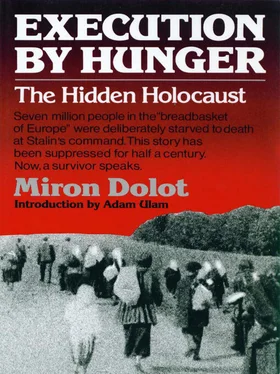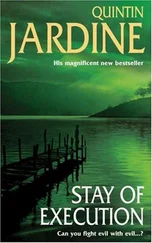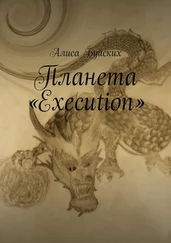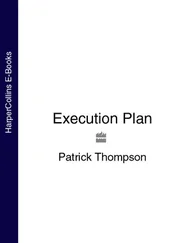Comrade Cherepin then stopped for a moment. The feeling in the hall was intense. We sat quietly with bowed heads. We knew only too well that those to whom the tag “enemy of the people” was attached were doomed. They never had a chance to defend themselves.
“I repeat,” Comrade Cherepin continued, holding his head high, “I did not publicly reveal that slanderous insult, for I did not want to insult neither our beloved Party and government, nor you. I say ‘you,’ because the Communist Party and Soviet government are yours.”
This was something new in his speech: he involved us in the whole case and it was rather strange to hear, for we hadn’t felt insulted. On the contrary, our sympathies were with Panas.
Comrade Cherepin started again: “But he, the accused, used this noble court to publicly repeat his black deed.”
We were preparing to listen to another patriotic speech, but then we suddenly heard Panas speaking.
“Good people,” he desperately shouted, “you are out of your minds! I said nothing of such a nature that could not be repeated here!”
But no one spoke to support him. All kept silent. Comrade Cherepin was carefully surveying the audience.
“Yes, you did,” he said, after a moment of silence. Then he started his own interrogation, completely ignoring Sydir, the judge, who was staring foolishly now at Comrade Cherepin, now at Panas.
“Tell me, how can you say such things to a Party functionary?” he asked Panas in an almost benevolent voice.
There was no answer.
“Have you nothing to say in your own defense?”
Panas mumbled something under his breath which no one understood.
“Did you willingly say to me, the Party representative, that I was a you-know-what?”
“Comrade Cherepin—” Panas started to say something.
“I am not your comrade!” shouted Comrade Cherepin. “How many times do I have to tell you that?”
“Well…” mumbled Panas.
“I haven’t finished my statement,” shouted Comrade Cherepin.
“I meant…” Panas tried again.
“What you meant does not count; only what you said counts,” cut in Comrade Cherepin. After a pause, he continued:
“I mean, perhaps you didn’t mean to call me and the Party and Government a you-know-what…”
“Well, I meant…” Panas started.
“I mean, perhaps you were a little bit excited? Is that what it was?”
It was obvious that Comrade Cherepin wanted Panas to admit publicly that he did not want to call him names; that he was sorry for what had happened in the field.
“Yes, yes, that’s what I meant; I didn’t mean to…”
We could see that Panas was losing ground. He kept repeating, “I didn’t mean to….”
Comrade Cherepin was all smiles. He knew he had broken his enemy. After one of those meaningful pauses of his, he turned finally to Sydir, the judge, and whispered in his ear.
But in the hall a great wave of confusion arose again. This time they wanted to know what the word zhlob meant.
“What is zhlob? ” someone shouted loudly.
Few, if any, actually knew what the word meant. Panas then explained that he did not know its exact meaning. He had first heard the word in the city; somebody had called him a zhlob when he was waiting in the bread line in front of a store.
There was no doubt that Comrade Cherepin had known precisely what that word meant; but he continued to insist that it had greatly insulted himself and the Party.
Actually, it was not so. I knew what that word meant, and I couldn’t help shouting:
“Request permission to explain,” I nervously intruded, and without waiting for permission, I blurted out:
“It isn’t a Ukrainian word; it’s Russian, and it means ‘ignorant boor!’”
After my hasty explanation, it was clear to everyone that Panas was not guilty of what Comrade Cherepin accused him of, or any crime, for that matter. But it did not help him. Comrade Cherepin’s insistence won, and the court ruled that Panas had insulted not only Comrade Cherepin, but the Party and government as well, and the case would be submitted to a higher court.
We never saw Panas again. From that time on, as if in memory of Panas, we called Comrade Cherepin “Comrade Zhlob”—behind his back, of course.
ONE OF the strangest facets of life on the collective farm was the introduction of various campaigns to solve a multitude of problems. In the years to come not a day would pass that we were not involved in one campaign or another.
For example, as spring approached, a Seed-Time Campaign was launched. All had to take part in it: men and women; young and old; healthy and sick. This campaign, as it stretched through the entire season, merged into the second campaign: the Harvest Campaign. This was followed by the Autumn Seed-Time Campaign. The fourth one was the Winter Campaign that prepared for the opening of the new Spring Seed-Time Campaign.
While these campaigns were in progress, other campaigns were continually being forced upon the farmers. These included the Tax Collection Campaign, the Campaign for Voluntary Delivery of Food to the State, and many others. Whether running concurrently, or attached to each other like a string of curses, these campaigns burdened us with a nagging weight.
As these campaigns whirled above the heads and through the long working days of the members of the collective farm, other smaller harpings plagued us. These were neatly outlined as “Problems” and “Questions.” There were such titles as “The Problem of Fertilizers,” “The Question of Increasing the Fertility of Pigs,” “The Problem of Raising the Cow’s Productivity,” “The Question of Eggs and Chickens,” and on and on. The bombardment with such titles to boost agricultural output was, at best, naive; but for us each campaign, with its related or unrelated outlines of problems and questions, signaled a new search for scapegoats as excuses for failure.
The goals of the Party and government for the collective farm were couched in simple terms: what is bad must be made good; a few must be made many; a little must be made much; small must become big. There was no limitation to goals, and thus no end to the endeavors and human sacrifices in terms of sweat, anxiety, and humiliation.
The officials demanded not only cooperation and rapid fulfillment of quotas, but also a cheerful and enthusiastic approach to the assigned tasks. The slightest sign of indifference was suspect, for it indicated opposition to official policy, and consequently, sabotage, as it was interpreted by the Communist officials.
Of all the campaigns, problems and questions, the Horse Campaign remains clearest in my memory. This was the most peculiar and ridiculous, and for some, the most tragic one.
A complete turnover of livestock ownership was effected by the collectivization of agriculture. As the farmer joined the collective farm, he was expected to contribute his stock to it. Naturally, he preferred to enter the collective farm with as few animals in his possession as possible. Many, embittered by the policy of collectivization, slaughtered their livestock prior to their forced joining of the kolhosp. Others attempted to trade or sell their animals. But not all could be sold, and those unsold were taken into the kolhosp stables under the new collective ownership.
If death is better than life in a total misery, then the fate of the animals under collectivization was worse than that of those slaughtered by the farmers, for the kolhosp stables were slow highways to the grave. Provisions for the care of animals were slipshod, if not entirely lacking. Forage was not available for them, and the farmers, deprived of their ownership, were indifferent to the fate of collectively owned livestock.
Читать дальше












